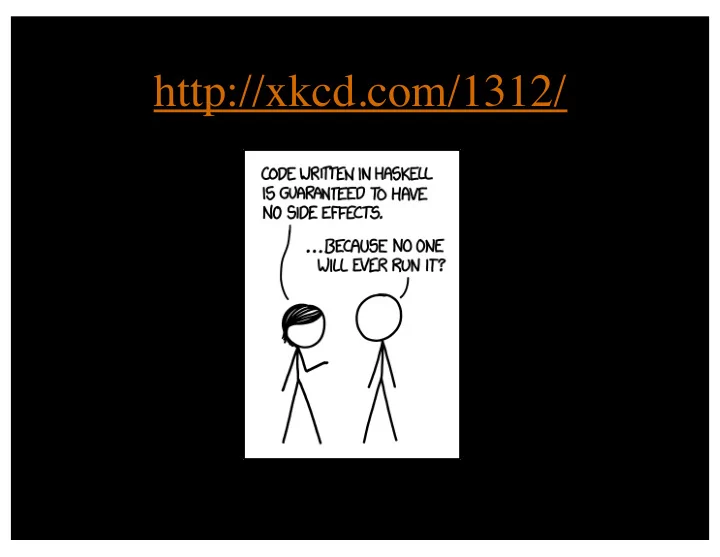

http://xkcd.com/1312/
Tony Hoare’s “Hints on Programming Language Design”
CS 252: Advanced Programming Language Principles Introduction to Haskell Prof. Tom Austin San José State University
Key traits of Haskell 1. Purely functional 2. Lazy 3. Statically typed 4. Type inference 5. Fully curried functions
Interactive Haskell $ ghci GHCi, version 7.6.3 ... Needed in ghci, Prelude> 3 + 4 but not in a script 7 Prelude> let f x = x + 1 Prelude> f 3 4 Prelude>
Running Haskell from Unix command line $ cat helloWorld.hs main :: IO () main = do putStrln "Hello World" $ runhaskell helloWorld.hs Hello World $
Haskell Base Types • Int – bounded integers • Integer – unbounded • Float • Double • Bool • Char
Lists • Comma separated, as in Java. • Some useful operators: – ++ concatenation – : prepend an item – !! get an element at the given index – head first item – tail rest of the list – last last item – init the beginning part of the list
List examples Prelude> "I hate the homeless" ++ "ness problem that plagues our city" "I hate the homelessness problem that plagues our city" Prelude> let s = "bra" in s !! 2 : s ++ 'c' : last s : "da" ++ s "abracadabra" Prelude>
Ranges Prelude> [1..15] [1,2,3,4,5,6,7,8,9,10,11,12,13,14,15] Prelude> ['a'..'z'] "abcdefghijklmnopqrstuvwxyz" Prelude> [1,3..27] [1,3,5,7,9,11,13,15,17,19,21,23,25,27] Prelude> let evens = [2, 4..] Prelude> take 5 evens [2,4,6,8,10]
List Comprehensions • Based on set notation: • The equivalent in Haskell is: [2*x | x <- [1..10]] • What does this give us? [(a,b,c) | a<-[1..10], b<-[1..10], c<-[1..10], A "tuple" a^2 + b^2 == c^2 ]
A Simple Function
> let inc x = x + 1 > inc 5 6 > inc 'c'
<interactive>:9:1: No instance for (Num Char) arising from a use of `inc' Possible fix: add an instance declaration for (Num Char) In the expression: inc 'c' In an equation for `it': it = inc 'c'
> inc 2.5 3.5 Is this the behavior that we want?
Adding a type signature . Now we will get a compilation error on inc 2.5 inc :: Int -> Int inc x = x + 1
Note the parens: > inc (-5) inc -5 would be a syntax -4 error Is this the behavior that we want?
Using pattern matching . inc :: Int -> Int inc x | x < 0 = This is a guard condition error "no negative nums" inc x = x + 1
Can't reassign variables in Haskell "If you say that a is 5, you can't say it's something else later because you just said it was 5. What are you, some kind of liar?"
Recursion • Base case – tells us when to stop • Recursive step – calls the function with a smaller version of the same problem
Recursive Example addNums :: [Integer] -> Integer addNums [] = 0 addNums (x:xs) = x + addNums xs
Lab: parts 1 & 2 (groups of 2-3) Lab assignment is in CodeCheck. Links are available in Canvas and the course website. Implement: 1. maxNum 2. "fizzbuzz" game > fizzbuzz 15 "1 2 fizz 4 buzz fizz 7 8 fizz buzz 11 fizz 13 14 fizzbuzz"
Types
Haskell Types • :type tells you the types for different values. • :t is a shortcut. Prelude>:t 'A' 'A' :: Char 'A' is a Char
What is the Type? Prelude>:t "Hello" "Hello" :: [Char] "Hello" is an array of Chars (i.e. a String)
What is the Type? Prelude>:t head What is a ? head :: [a] -> a Is a a type? a is a type variable; it stands in place of other types.
What is the Type? Prelude>:t (==) (==) :: Eq a => a -> a -> Bool This symbol indicates that Eq is a typeclass Eq a indicates that a may be any type, provided that it satisfies the expected behavior. (Think of Java interfaces)
Some Typeclasses • Eq – Support equality testing • Ord – Can be ordered • Show – Representable as strings • Read – Buildable from a string representation • Enum – Sequentially ordered • Bounded – Upper and lower bound
JSON example (in class)
Lab 1, part 3: JSON pretty printer Download JSON.hs and jsonDriver.hs In JSON.hs, implement the JObject case in toString
HW1: implement a BigNum module HW1 explores how you might support big numbers in Haskell if it did not support them. • Use a list of 'blocks' of digits, least significant block first. So 9,073,201 is stored as: [201,73,9] • Starter code is available on the course website. NOTE: YOU MAY NOT CHANGE THE TYPE SIGNATURES.
Overview of Homework • Grade school addition • Big number addition • Grade school multiplication • Big number multiplication
Read "Learn you a Haskell" chapters 4 & 5
Recommend
More recommend